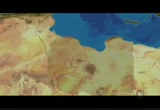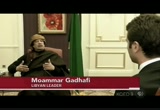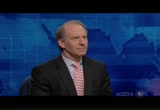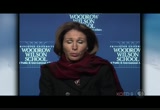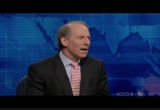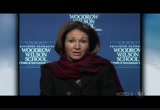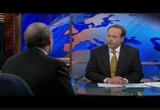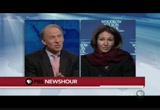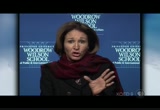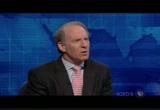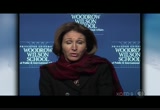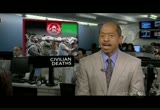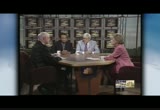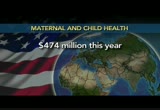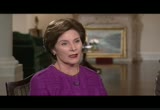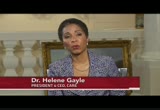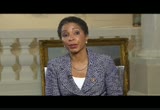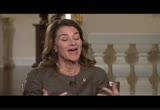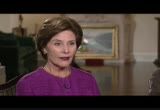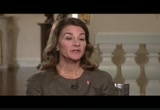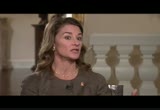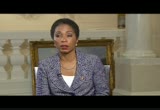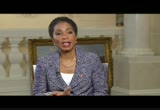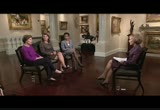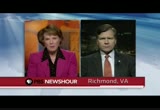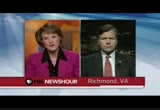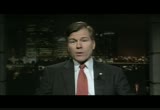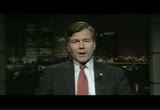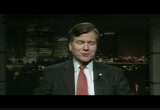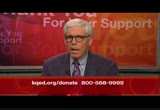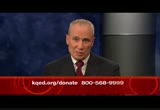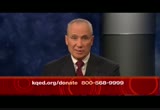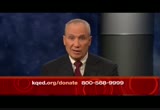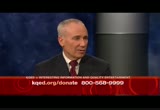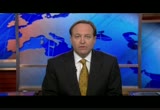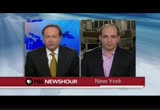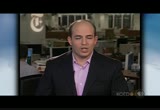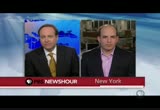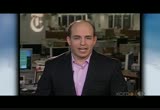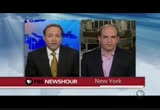tv PBS News Hour PBS March 9, 2011 6:00pm-7:00pm PST
6:00 pm
captioning sponsored by macneil/lehrer productions >> lehrer: good evening. i'm jim lehrer. moammar qaddafi said libyans will fight back if other nations impose a no-fly zone over the country. >> brown: and i'm jeffrey brown. on the "newshour" tonight, we have the latest on the battles for key towns to the west and east of tripoli. and former state department officials richard haass and ann-marie slaughter debate whether the west should intervene. >> lehrer: then, judy woodruff talks with laura bush, melinda gates, and helene gayle about foreign aid programs aimed at women and children. >> we need to be sure we are looking at the world wide and it is in our security interests as
6:01 pm
well as our moral interest to pay attention to the rest of the world. >> brown: margaret warner interviews republican governor bob mcdonnell of virginia about battles in the states over public-sector unions. >> lehrer: and we look at the shake-up at npr, after a high level executive was shown on a hidden camera criticizing republicans. that's all ahead on tonight's "newshour." major funding for the pbs newshour has been provided by:
6:02 pm
6:03 pm
and... this program was made possible by the corporation for public broadcasting. and by contributions to your pbs station from viewers like you. thank you. >> lehrer: this was another day of fierce fighting in libya. forces loyal to moammar qaddafi used tanks and sniper fire to press their assault on zawiyah, outside tripoli. doctors reported at least 40 people killed in the latest fighting. meanwhile, qaddafi again rejected any attempt at outside intervention. we have two reports from "independent television news," beginning with jonathan rugman, in tripoli. >> reporter: this was state television's sanitized version of zawiyah's outskirts today. peace and tranquility are returning after zawiyah was
6:04 pm
freed from al qaeda linked gangs, the channel said. a reporter interviewed qaddafi's fighters, all dressed in the green of his 1969 revolution. "i'm a volunteer" said one. "i came to liberate the city from gangs and al qaeda and the army is 90% in control. the presenter then told libyans that masses of people were flowing into zawiyah's streets in support of moammar qaddafi a message echoed by supposedly ordinary residents. >> ( translated ): there was no shelling, to no air strikes, some people had weapons but we didn't see any destruction like al jazeera said. it's all lies. >> reporter:. >> ( translated ): the situation is perfect. the libyan army entered zawiyah and made the city secure. >> reporter: we tried driving into zawiyah independently today. it was our fifth unsuccessful attempt. the town is surrounded by checkpoints like this one where journalists have been arrested and detained.
6:05 pm
but we did reach zawiyah on sunday and perfectt was not. rebels and residents now claim by telephone that bodies lie unrecovered in these ruins. while zawiyah was being bombarded last night, the colonel kept the foreign press waiting eight hours for a glimpse of him at our hotel. he gave two interviews, one to a turkish reporter in which he dismissed plans for a no-fly zone as a foreign plot. >> ( translated ): it appears that it is a plot against libya. in the end it means the determination to take control of libya and to steal their oil. then the libyan will people will take up arms against them. >> reporter: in zawiyah, libyan state television is this evening showing scenes of wild celebration amongst qaddafi supporters amid government claims that it is mostly recaptured the town. in the past, those claims have proved inaccurate and rebels
6:06 pm
counterclaim that the battle is not over and that they will regain control tonight. >> brown: there was also fighting to the east of tripoli, including new strikes by qaddafi's air force. lindsey hilsum reports from that part of the country. >> reporter: two small towns in the eastern libyan desert now the scene of intense fighting. between ras lanuf and bin jawad, rebels battled it out against colonel qaddafi's troops today. the rebels are not giving up, but their defensive line is ragged. they carry out hit-and-run raids because they're outgunned. this is a sparsely populated area but crucial because the rebels need to hold fit they're to advance on colonel qaddafi's hometown of surt and because of the oil installations along the coast. today, qaddafi's forces hit the
6:07 pm
oil terminal at the port of sidra near ras lanuf, sending a huge plume of smoke into the air. the attack on the al sidra oil installation is the most serious economic damage which has been done in the east. the people here are also thinking about the human costs. this morning in this hospital, another hour or so east, we found a fighter whose leg had been amputated late last night after similar raids yesterday. we were told he had been fighting for colonel qaddafi but all patients are treated here. >> when he was here, he came for help, he was wondering "where are the americans?" he was told... he got information that they were fighting americans here and our country's been invaded, that's why he went for fighting. but he was fighting his own people. >> reporter: these young men went to war confident that their determination would be enough to oust colonel qaddafi. now they're not so sure.
6:08 pm
>> lehrer: in another development, a top libyan general flew to egypt, apparently carrying a message from qaddafi to egypt's military rulers. libyan emissaries also traveled to europe to meet with european and nato officials. >> brown: so, should the west, should the u.s intervene in libya? we join that debate with two people who've wrestled with similar questions as director of policy planning at the state department. richard haass held that position in the george w. bush administration. he's now president of the council on foreign relations. his latest book is, "war of necessity, war of choice: a memoir of two iraq wars." anne-marie slaughter worked in the obama administration state department until earlier this year. she's now professor of politics and international affairs at princeton university. anne-marie slaughter, i'll start with you. we've heard some of those fighting against qaddafi calling for outside help, specifically a no-fly zone. what's the chief argument for helping them >> the strongest argument for
6:09 pm
helping them is stwra t.j. i can which is that we've finally seen a major shift in the theirty of the entire middle east from anti-americanism and anti-israel and focused, really, outside to an indigenous demand for democratic government, for accountable government, for government that provides decent services by the young people of the region who are the majority of the region. they are now asking us to help. they're expecting to see us deliver on our verbal mittment to that kind of government the organization of the islamic conference-- which is every islamic country in the world-- is asking for a no-fly zone. and we have a chance to actually put ourselves where our words have been for decades on the right side in the middle east. >> brown: richard haass, you wrote an on said with the
6:10 pm
headline "the u.s. should keep out of libya" in the "wall street journal". what's your chief arguement. >> let me paraphrase what you just heard. it's not strategic. our interest is in in way warranted. libya is the least important country in the middle east. we should be focusing on egypt, saudi arabia, iran, iraq. limited interventions would not turn this thing around. no-fly zones and the like would not be decisive. interventions that might be deice i have would be far, far, for more costly than our interests warrant. one last thing, who would we be helping? we know we hate qaddafi, our people do. but are we so sure that those we would be helping are good guys? do we really think if we went in they'd all be reading "the federalist papers" in arabic translation a couple days later? we don't know enough about libya. one of the lessons of iraq and afghanistan, i would suggest, only intervene militarily if you really know the country well you have no know what you're getting into. we clearly do not. >> brown: so we don't know enough about who we'd be helping and that the intervention would
6:11 pm
be effective. ann-marie slaughter, start with the effectiveness of a no-fly zone. you acknowledge that a military intervention, but you think it could be effective. >> let me start just by saying what i'm you can toing about. i'm talking about a no-fly zone which would involve attacks on anti-aircraft capability but i'm not talking about boots on the ground and i am assuming that we would actually be requested by the revolutionary council to give that kind of aid and it would then be supported, as i said, by every other islamic country in the world and people in the region. so with that, it certainly would help the opposition. you can see what qaddafi's air strikes are doing on the news. you can see how he is using his air power. we would basically neutralize that. there's no guarantee that that is, in fact, going to allow the rebels to win, but we can be quite certain that if we don't do that and if qaddafi then wins
6:12 pm
then he's got everybody severely outgunned, then he will taken a absolutely terrible retribution and in the views of many in the region, we will have stood by and let that happen notwithstanding our repeated calls for exactly what the opposition is fighting for. >> brown: let me stop you on that point. richard haass, do you ignore... she makes the point. you see it on television, we might see much more. so do you ignore mass casualties? is there some point where you do step in with... something like a no-fly zone? >> well, first of all, let's keep it in proportion. this is not rwanda where million 800,000 innocent men, women and children lost their lives. this is something on a far smaller scale. do we ignore it? no. there's all sorts of humanitarian actions we can take to keep people alive. by the united states is overextended in two wars. if there's going to be some sort of humanitarian or large-scale intervention it would have to be a lot more than a no-fly zone which, quite honestly, is
6:13 pm
symbolic. >> brown: symbolic because... >> the planes and helicopters that qaddafi is using are not central to his ability toll defeat the opposition. we have to stop the tanks, the a.p.c.s, the mercenaries. you actually to have to put people on the ground. you would have to arm people, but any time you arm people you don't know what they're going to do with those arms so no-fly zone to me is the worst of all worlds. it's the little bit pregnant problem. it gets you a little bit involved, it won't turn the tide and then what? >> it does what you can. >> it's exactly sort of symbolic action that american military forces should not take. it's not strategic, it's not serious. again, i'm suggesting our interests are not sufficiently large. they're certainly not vital to warrant the kind of full-scale intervention that might make it.... >> brown: anne-marie slaughter. what about that and his earlier point that you don't know exactly who the opposition is, who you're helping and what you get at the end and, as he puts it, without the kind of larger interests at the end of the day? >> well, let's tackle the core
6:14 pm
point. richard thinks this is not in our interest because he's looking at it solely in terms of is it in our vital interests as to who governs libya? and i'm saying that's a very narrow view of our interests given that we have spent the past 20 years in the middle east fighting various battles and we are finally seeing across the middle east a major movement driven by young people for the kinds of government we seek. and it's in that context that i am saying doing what we can-- even if success is not guaranteed-- is very much in our interest and not doing anything will be seen as actually siding with qaddafi. there are not mass casualties now, but qaddafi has made absolutely clear that he will do whatever is necessary to crush this and that will mean, if he retakes rebel cities, unbelievable violence.
6:15 pm
>> brown: well, that puts hit in the largest frame, right? getting on the right side of whatever is happening in the middle east? getting on the right side of history? >> but strategy is about linking what it is you do, the costs you're willing to pay for your foreign policy, to your interests. to have a tremendous mismatch, to invest far more than our interests warrant makes no sense. secondly, this idea of getting on the right side of history, why we so sure if we intervene that things turn out right? most revolutions in history start out a lot happier than they end up. why are we so confident that we know enough about the tribal structure of libya, about the various clans that are competing for power that if we intervene that the guys we want are going to win, that we're not, for example, going to create security vacuums that might be exploited by an al qaeda in which various types of radical islamists may not come to power. again, we should have learned some humility here. we should have learned that in these countries we've got to be extremely careful. there's no guarantee and there's not even reason to be confident that if we go in and remove old
6:16 pm
structures, new structures more to our liking are going to come into power. indeed, i would suggest something very different is likely to happen. >> brown: very briefly, anne ha-moo ree slaughter, your response to that? >> we don't know what will happen but we can be quite certain if qaddafi wins this the results will be devastating and that will be felt throughout the middle east in terms of what people were calling on us to do. we have spent 20 years calling for democracy in the middle east. we actually tried to impose a democracy by force. now people are calling for us to help and we stand back and don't do what is in the end quite limited measure. we will republic the missed opportunity. richard wrote a book called "the opportunity." this is a great, important, strategic opportunity and we have to take fit we're requested to. >> brown: anne-marie slaughter, richard haass, thank you both very much. >> lehrer: still to come on the
6:17 pm
"newshour": foreign aid programs for women and girls; virginia governor bob mcdonnell on public sector unions and troubles at npr. but first, the other news of the day. here's kwame holman. >> holman: a new outbreak of sectarian violence hit egypt overnight and today. at least 13 people were killed, and 140 wounded. there was burnt debris in the streets of cairo after muslims attacked christian demonstrators late tuesday. the christians also turned out today, again protesting the burning of a church. in saudi arabia, the foreign minister warned against plans for mass protests on friday. he said the regime will "cut off any finger" raised against it. instead, he said reforms can be achieved through dialogue. in northwest pakistan, a suicide bomber killed 36 people and wounded more than 100 at a funeral attended by anti-taliban militia men. it was the deadliest attack in the country this year. about 300 people had gathered when the attacker struck. later, men sorted through stacks of shoes and clothing belonging
6:18 pm
to the victims. the pakistani taliban claimed responsibility for the bombing. civilian deaths in afghanstan spiked last year. the u.n. reported today that well more than 2,700 civilians were killed, mostly in roadside bombings, suicide attacks and similar incidents. insurgents were blamed for 75% of those deaths. deaths blamed on the u.s. coalition fell again. but general david petraeus, the top u.s. and nato commander in afghanistan acknowledged it's still a serious issue. >> we absolutely have to take measures to reduce to the absolute minimum civilian casualties in the course of our operations. our forces understand that. we know that we're here to protect the afghan people. and sfwi way, to protect them from the taliban, too. >> holman: petraeus apologized earlier this week for an air raid that killed nine afghan boys. the man accused of trying to murder an arizona congresswoman has pleaded not guilty to 49 new
6:19 pm
federal charges. jared lee loughner appeared in a tucson court. he's charged in the january shooting rampage that killed six people and wounded 13. one of those was congresswoman gabrielle giffords, who's recovering from being shot in the head. the u.s. senate rejected rival plans today to cut spending. one plan already adopted by house republicans would cut more than $60 billion dollars in the current fiscal year. the other offered by senate democrats would have cut $12 billion. congress still has to come to a compromise, in order to fund the government through september. the current funding expires march 18. wall street finished the day with modest losses. the dow jones industrial average fell one point to close at 12,213. the nasdaq lost 14 points to close at 2,751. one of the nation's best-known political reporters and columnists david broder died today. he passed away at a hospice in arlington, virginia, after complications from diabetes. he was dean of the washington
6:20 pm
press corps, and his column still appeared twice a week in the "washington post," where he worked for 45 years. david broder covered every national campaign and major party convention since 1960. he earned a reputation for an even-handed approach and won the pulitzer prize for distinguished commentary in 1973. broder frequently sat at nbc's "meet the press" roundtable more than 400 times, far more than any other journalist. he also appeared on pbs programs, including "washington week." >> obama decided early on that he could compete. >> holman: and on the "newshour" in december 2000, broder discussed the disputed presidential election between al gore and george w. bush. >> it's hard for me to see how gore ultimately wins on the basis of tossing out absentee votes. i think that's an action that would really provoke a counterstroke from the florida legislature, and then we're
6:21 pm
really in deep trouble. >> holman: broder authored a number of books over the years all with politics as the central theme. and in later years, he found time to teach journalism at the university of maryland and duke university. david broder was 81 years old. those are some of the day's major stories. now, back to jim. >> lehrer: next, maternal and child care as an international issue. the u.s. now spends $474 million on the problems faced by women and the administration's new budget would add another $372 million. today in washington, the private aid group, care, held a conference to give a special push to the effort. judy woodruff talked earlier today with three prominent participants at that meeting. >> former first lady laura bush, melinda gates, dr. gayle, president of care, thank you all three for talking with us. mrs. bush, you're here together,
6:22 pm
the three of you, to talk about what girls and women around the world are facing and yet this is at a time when president obama is having to worry about cutting programs for women and children in this country. what does that say about the challenge you face? >> well, we are here all together to celebrate or to mark international women's day and to talk specifically in this case about maternal health, about what we can do for women at the time they deliver and what we can do for babies and families in those few months after a woman delivers. and this is the problem. this is the question that everyone's asking now. how can we help people in our own country as well as people around the world? and both melinda, obviously, and helene with care international have a worldwide to make sure people have good health, especially babies and women and children. and that's really what we're
6:23 pm
going to be talking about is how can we allocate resources? what can we do to make sure people come together to help both people here in the united states as well as not neglect people around the world. >> woodruff: well, dr. gayle, care, the organization you head, works in some 70 countes to fight poverty. how worried are you right now? i mean, in the climate that we are in right now, congress is talking about cutbacks across the board, including in foreign assistance, how worried are you? >> well, i'm pretty worried. i'm worried because i think that if the american people and if our congress understood better what a government investment this is that they might make different decisions. we're here for our national conference. we have some 1,100 advocates who are going to go to capitol hill tomorrow and try to convince their lawmakers that, in fact, it's good investment. you know, the american people think that we spend something
6:24 pm
like a quarter of our budget on foreign assistance but if you ask them how much they would be willing to spend, they say they'd be willing to spend 10%. and yet we spend less than 1% of our budget on foreign assistance. it's a good investment. it saves lives, it helps to grow economies, and it's great for long term peace and stability. so i think the news... the message has to be that this is a good investment and it's in our short term but also our long-term interests to make sure we invest in foreign assistance. the. >> woodruff: melinda gates, you with your husband bill run the wealthiest foundation in the world. you are focused on vaccines, education, but in particular you're interested in women and girls. some people are going to listen to this debate about public assistance and say "why can't the gates foundation pick up the slack?" why doesn't it work like that? >> well, i think what people have to understand is that even though our foundation looks very large, the problems that we're choosing to tackle are
6:25 pm
absolutely enormous and our money is actually tiny in this. all that philanthropy can do is be a stimulus. is to stimulate innovation. so what we've tried to do is help bring down the vaccine prices so then as governments procure those vaccines... so our government has been very generous and needs to continue to be, to buy these very inexpensive sometimes a few cents, 13 cents for a measles vaccine will save a child's life but you need government funding to do that if you're going to cover millions of children, which we can do. so it's not a matter of can we do this, we know how to do this. it's a matter of will we do it and will we be generous enough to keep doing it? >> brown:. >> woodruff: mrs. bush, another argument one hears at a time the united states is fighting two wars, facing turmoil as we here in the middle east, the republican chairman of the house subcommittee focused on foreign assistance, congresswoman kay granger of your home state of texas is saying whatever foreign assistance we give has got to be
6:26 pm
tied to national security. how do you... >> well, it is, really. i think disease and all the things that we treat are tied to national security in a lot of ways that we maybe don't realize or that the american people don't realize. if other countries has a chance to be stable, that helps us. if there are ways to prevent-- and we can because we are a wealthy country-- if there are ways we can help other countries defeat diseases. as melinda was telling me earlier, we're about to totally eradicate polio. can you imagine? that would be so terrific. but all of these are helpful to other countries. if you take the burden of health care, of diseases off the backs of some other countries, it gives them a chance for them to use their own very limited resources in ways that help their people. and also there's a hopelessness associated with deadly diseases that if that can be alleviated, people can build their own
6:27 pm
economies in their own countries and they'll be less reliant on the developed world for help. >> woodruff: melinda gates, there's also the competition when it comes to domestic needs which we mentioned a moment ago. we're still coming out of the recession in this country, people focused on jobs, as we mentioned, president obama has been recommending cuts in women and infant programs in this country. you were with president obama yesterday. did you say anything to him about some of these international programs? >> well, bill and i have spoken with president obama before several times about the international programs and he has a huge commitment to them. he's kept up the president's emergency plan for aids relief that was started under the bush administration because he believes in that. he's kept up the president's malaria initiative. he's invested in maternal and child programs. those are all parts of his international budget. so we've spoken with him about that and the importance of that before. yesterday was really focused on education because both the state budgets here under tremendous pressure to cut education
6:28 pm
funding in our schools which is imperative. you've got to fund our u.s. schools if you want to create jobs. and so that's what yesterday was focused on, really, with him. >> couric: but what's your sense of his commitment to the kinds of things you're talking about snowed >> huge commitment, huge commitment. he completely gets it, he completely believes in these maternal and child programs in particular and he knows that also if you build up a woman so she stays alive and her child stays alive and she's not taking care of that child she can feed the child, educate it and build her economy. we export to those emerging economies and that creates jobs for us. so they're all lengthed. they're all hand in hand. >> woodruff: still, there are voices saying at a time when this country has so many needs. we hear the tea party arguing foreign assistance a waste. these are on top of arguments we've been hearing for years, that foreign assistance is not spent efficiently.
6:29 pm
they ask why can't aborganization like care pick up what the government... >> well, it's going to take all of us. as melinda said, there is no one institution. there is no one organization that's going to do this. it's going to take the government. it's going to take the private sector. it's going to take the n.g.o. sector like care and other organizations. but it's going to take all of us working together to be able to use our comparative advantages, if you will, to really build this solution. and, you know, i think if people... again, i think if people understood what a good return on investment this is, there would be a very, very different dialogue around this. when people realize how inexpensive it is, pennies, to save a child from dying needlessly from a diarrheal disease or measles or the diseases that we don't even have here in this country, for a $2
6:30 pm
loan that a woman can take out from a microfinance program to start a business that then sends her children to school, her children will be more likely to be healthy earn an income themselves. what a virtuous cycling you create with that $2. those are the kinds of things i think people don't realize. and if we leave in we leave the potential of half of this world behind, it's not in our best interest, either. it's in our best interest to have safe, stable, and growing economies around the rest of the world and that's what we're invested in. >> woodruff: to those people watching and listening to this interview who are among the group who think foreign aid is 25% of the budget how do you get the message asdplosz >> i think if we're at least dealing with facts. it's really important obviously for people to realize that it is a very small percentage, only
6:31 pm
12% of our total economy, of our total budget and i think that's important for people to know. but i also know that americans are very generous. i know many, many americans are proud that their taxpayer dollars have saved lives in africa through the president's malaria initiativetor emergency relief plan for aids. and when i traveled-- which i did five times-- to subsaharan africa and visit programs there, they were run by programs like care or catholic chirts, sometimes... some faith-based, some small programs, world vision, many, many programs that americans also invest in through their churches or their synagogues or other ways. i know americans are generous and they would not like the idea of someone who's been on an a.r.v. with h.i.v. to be taken off of it.
6:32 pm
diseases don't respect borders. the edge of the american border... that's the edge of the diseases, we need to be sure we're looking porld wide and it is in our security interests as well as our moral interests to pay attention to the rest of the world. >> woodruff: i hear in the your voice as i do in the voices of melinda gates, dr. helene gayle, mr. laura bush, thank you all very much for talking with us. >> thank you. >> lehrer: tomorrow night, we'll get another view from texas congresswoman kay granger. she chairs the house subcommittee that oversees foreign aid appropriations. >> brown: now, to the continuing battle between states and public sector unions. margaret warner has the story. >> warner: the stalemate in wisconsin between its republican governor and state employee unions is now in its third week with no clear end in sight. senate democrats fled the state to prevent a vote on governor scott walker's move to sharply restrict collective bargaining for most public unions.
6:33 pm
as the dispute mushroomed into a national controversy, the republican governors' association aired a television ad supporting walker. last week, we heard from afl-cio president richard trumka on the controversy. tonight, we talk to virginia governor bob mcdonnell, vice-chair of the republican governors association. governor, welcome, thanks for joining us. >> thank you, margaret, i appreciate being on, thanks. >> warner: you 29 republican governors run very different states, you have different situations vis-a-vis your public employee unions. why have you collectively come out to support governor walker in wisconsin? >> governor walker is a new governor. he's making tough choices. he's got a $3.7 billion budget deficit and he's being honest with the citizens to say, look, we've got to be able to cut spending, make tough choices and some of those involve participation by employees of
6:34 pm
their state in paying more into their pensions and benefits, something i've dodd do in virginia. so we think the governor is making the tough choices that have to be made in these austere budget times, martha, so we're supporting his efforts. >> warner:. >> warner: now mr. trumpka said last week if the aim is to reduce the wisconsin deficit, that public authority employees have already agreed to the budget concession it is governor asked for. something you mentioned which is contributing more to the health and their pension system. so why is that not enough? >> well, that's a decision for the people of wisconsin and governor walker on that. each state makes their decision on union management relations. i happen to have the benefit, margaret, of being in a right of the work state. we ban collective bargaining for public sector employees 20 years ago and it's given me virginia a
6:35 pm
great opportunity to trumpet our state as a great place to do business and i think that's what governor walker is trying to do and that's the call of the people of wisconsin. our... what we're trying to support in that score is to say these 14 senators that have fled the state aren't on the battlefield of democracy and aren't willing to show up and debate the issue and vote, that that's wrong, they ought to come back, have a debate and be able to do what's right for the people of wisconsin. >> warner: do you think is that really governor walker's name is to really end public employees' right to collectively bargain? do bargain collectively over their wages and benefits and become a state like virginia? >> i think what every governor would like to be is coming out of the global economic downturn is to have a better story to tell to get businesses to come to your state and having those advantages certainly is a positive. i think governor walker understands that if there's
6:36 pm
going to be ongoing collective bargaining in future years it's going to potentially continue to increase the cost of doing business in government and it's a long-term budget driver. so that issue is up to the people of wisconsin. i can only tell you from virginia experience it gives me a great advantage here in our state and i think he'd like to have his state be more competitive. >> let me ask you about something mr. trumpka said. he said you and other republican governors, he thought this wasn't really about balancing a state budget but trying to take away the rights of workers to come together to bargain for a middle-class life. he also said he saw essentially a concerted campaign by a number of republican governors to vilify public employee unions. what do you say to that? that >> that's flat wrong. i have 103,000 state employees who work in virginia, they're hardworking decent people and do great work for our state. we take good care of them. we have a good benefit plan, good health insurance plan.
6:37 pm
you know, i'm trying to tell our state employees as well in virginia that we're one of only four states that doesn't have to pay anything into the pension plan and that's not sustainable. we need shared sacrifice because we have $18 billion in unfunded liabilitys in the pension plan. so that's what it's about for me. i think that's what it's about for other governors. we've had to make tough choices in virginia to cut our spending back to 2006 levels. it involves gutsy decision. governor walker is doing the same thing. we appreciate that he's being honest with the citizens about what it will take to create solvency in the pension system and ongoing fiscal responsibility in the state. >> woodruff:. >> warner: there's been a raft of polls in the few days, "new york times," "wall street journal," bloomberg, all showing that the american pub slick actually almost by a two to one margin not in favor of what governor walker is trying to do and does not think that public employees should be stripped of
6:38 pm
the right to collectively bargain of have a union represent them in bargaining over wages and benefits. does that concern you? does that worry you that you're losing the public opinion battle here? >> i haven't seen that poll but leadership takes courage and when you give people tough choices sometimes they're unpopular, but when you have a $3.7 billion budget deficit-- i had a $4.2 billion deficit last year-- i had to make tough choices. they weren't popular, but now we have a surplus in virginia. he's having to do the same thing in wisconsin and sometimes when you make those tough choices sometimes the people don't like those tough call bus i admire him for standing up saying what he thinks needs to get wisconsin on the right fiscal track. >> warner: i wanted to be sure i understand. even though the employees have made all the budget concessions, you think giving up collective bargaining is important, what, for the future?
6:39 pm
>> well, that's... again, i'm not going to impose virginia's views. that's what we have in our state. that's up to the people of wisconsin. but what i think the governor is saying is that long term having the current collective bargaining position will add to increased benefits and costs of public sector employees which is going to increase the cost of governance. so he's trying to take care of this long term problem that he knows are going to continue to add to budget problems for his state. i tell you what the people don't like in wisconsin and, frankly, most states is people not being on the... not being in the marketplace of ideas and not being willing to show up to fight the battle. he said senators that are being paid to do a job and they're not there and i think people don't like that. >> warner: this is a question my colleague judy wood rough asked mr. trumpka. very briefly, do you think what's happening in wisconsin could be a waterloo for this issue nationally? >> well, many states have turned
6:40 pm
the corner. 22 state are right-to-work states. we've already made those kinds of decisions. it's got an lot of national attention because of the fiscal plight of the states and in addition to spending cuts these are part of the things that some governors in wisconsin and indianapolis and ohio are taking a look at to try to control their long-term pension and benefit costs. it's a state-by-state issue. we've made the decision in virginia. i think it's right for our state. >> woodruff: governor bob mcdonald of virginia, thank you so much. >> lehrer: this is pledge week on public television. we'll be back shortly with a look at the high-level resignations at npr. this break allows your
6:47 pm
>> brown: finally tonight, npr's c.e.o. departs amid a growing storm. >> from "npr news" in washington, i'm craig wyndham. the president and c.e.o. of npr, viivian schiller has abruptly resigned today..." >> brown: news of vivian schiller's departure followed yesterday's release of this hidden-camera video. it showed npr fundraising executive ron schiller-- no relation-- at what he thought was a meeting with potential funders. among much else, he was heard disparaging tea party
6:48 pm
republicans. >> they believe in sort of white, middle america, gun toting, i mean, it's scary. they're seriously racist, racist people. >> brown: and he also commented on the hot-button issue of npr's use of public money. >> it is very clear that we would be better off in the long run without federal funding. >> reporter: indeed, the video came as republicans in congress are pressing to eliminate more than $400 million-a-year in federal funding of public broadcasting, including pbs. the man behind the video release was conservative activist james o'keefe. his associates-- posing as members of a fake, muslim organization -- lunched with ron schiller in late february, offering to donate $5 million to npr. the fundraiser resigned yesterday, though he had been planning to leave npr anyway. vivian schiller had served in her post two years. she drew criticism last year over the firing of commentator juan williams, after he said on
6:49 pm
fox news that flying with some muslims scared him. o'keefe has previously gone after the community action group acorn with hidden cameras and last year, he was arrested and pleaded guilty to a misdemeanor charge of attempting to bug the offices of louisiana democratic senator mary landrieu. this afternoon, a spokeswoman at pbs, the tv side of public broadcasting that operates separately from npr said one of its executives also met with people who claimed to be with the same fake muslim organization. those discussions ended when pbs couldn't confirm the group's credentials. for more on all this, i'm joined by brian stelter, media reporter for the "new york times." brian, you talked to vivian schiller and others today. tell us about the decision to end her tenure. >> the decision happened pretty quickly yesterday. all about 12 hours after this video emerged on the internet. it was seized upon by conservative blogs and also
6:50 pm
generally by the media as yet another setback for npr. and by about 7:00 p.m. on tuesday vivian schiller was on a phone call with npr's board of directors, many of whom are managers at local stations who have been frustrated for months about the kosovo that's surrounded npr. after about an hour she offered to resfin the board wished that to happen and sure enough they decided they did want that it was announced on wednesday morning and now npr finds itself without a permanent chief executive or chief of fund-raising. >> brown: fill in the video itself. as we said it was a group sighing it was a muslim organization but even further saying they had ties to the muslim brotherhood? >> that's right. this was a classic setup where they were trying to goad the npr executives into saying things on camera that were going to make news. sometimes the npr executives didn't take the bait.
6:51 pm
sometimes they sat there and nodded their heads and didn't comment but other times they did seem to take the base. this executive, ronald schiller, said he was expressing his own personal opinions but he was talking about tea party members as being racist. he was talking about republicans generally as being anti-intellectual and as we heard in the segment there, he also talked about the fact that npr has federal funding and that npr would be better off without it. that was seized upon quickly by congressional republicans who say npr shouldn't have any federal funding and going forward here in the next few days we'll continue to hear that point come up gwen and again. >> let's talk about that last point because that, of course, is not the official... the official point of view of npr >> that's right. npr says this federal funding is vital. helps the average station by about 10% of their budget and for some stations that means $100,000, other stations that means millions of dollars and it would be hard to recoup that money any other way
6:52 pm
>> i talked to station managers across the country who said it would mean less journalists, less high-quality programming and in some cases less transmitters and repeaters, these small stations that transmit signals to rural areas clearly funding is important to those stations and maybe they could make up some of the difference from private groups and citizens but managers are worried they wouldn't make up all of it. >> reporter:. >> brown: mr. o'keefe, the man behind this, has a history of these provocative stings, i guess that's what you'd call them. >> he does and he often relies on compelling edited videotapes that he can then get attention for in the media. in the past he's used networks like fox news to carry his messages they will leak videos very carefully in order to encourage maximum exposure of his videotape he did this with the group acorn a while back
6:53 pm
around now we see him going after npr in the same way. >> brown: as you mention mentioned this was seized upon quickly and it's something we watched with great interest here. how much has npr become the focus? how much of these kinds of developments have become a focal point for what is after all part of a much larger budget debate now? >> you know, npr becomes a symbol, really, i think this case, juan williams was fired only a couple weeks before the election so some people running for office that are now in congress actually see this as a campaign promise to defund npr because to them npr is a symbol of what they view as liberal bias and elitism and they want to take that down. many of their constituents listen to npr most likely, but it has become a symbol for them even though it's a relatively small amount of the budget it's a main talking point, i think, for some of these congressmen. >> brown: and briefly, npr going forward, what did they tell you about how they tried to separate themselves from what this
6:54 pm
fund-raiser did? >> the fact that he... both ron schiller and vivian schiller who are unrelated who are both left is a fresh start for npr. hopefully this means they can have a new direction with a new chief executive but they're going to have a tough time finding a chief executive in the middle of this budget battle. the timing is not great for an korgs that's been beset by controversy for the last few months now they have to figure out a new way forward. >> brown: thanks very much. >> thank you. >> lehrer: again, the major developments of the day: there was fierce fighting again in libya. forces loyal to moammar qaddafi pressed an assault just outside tripoli and attacked oil facilities to the east. and a taliban suicide bomber killed 36 people in northwest pakistan, the worst attack there this year. >> brown: and that's the "newshour" for tonight. on thursday, we'll look at: the house hearings on islamic radicalism. i'm jeffrey brown. >> lehrer: and i'm jim lehrer. we'll see you online and again
6:55 pm
here tomorrow evening. thank you and good night. major funding for the pbs newshour has been provided by: >> i mean, where would we be without small businesses? >> we need small businesses. >> they're the ones that help drive growth. >> like electricians, mechanics, carpenters. >> they strengthen our communities. >> every year, chevron spends billions with small businesses. that goes right to the heart of local communities, providing jobs, keeping people at work. they depend on us. >> the economy depends on them. >> and we depend on them. >> you can't manufacture pride, but pride builds great cars. and you'll find in the people at toyota, all across america.
6:56 pm
and the william and flora hewlett foundation, working to solve social and environmental problems at home and around the world. and with the ongoing support of these institutions and foundations. and... this program was made possible by the corporation for public broadcasting. and by contributions to your pbs station from viewers like you. thank you. captioning sponsored by macneil/lehrer productions captioned by media access group at wgbh access.wgbh.org
210 Views
IN COLLECTIONS
KQED (PBS) Television Archive
Television Archive  Television Archive News Search Service
Television Archive News Search Service 
Uploaded by TV Archive on

 Live Music Archive
Live Music Archive Librivox Free Audio
Librivox Free Audio Metropolitan Museum
Metropolitan Museum Cleveland Museum of Art
Cleveland Museum of Art Internet Arcade
Internet Arcade Console Living Room
Console Living Room Books to Borrow
Books to Borrow Open Library
Open Library TV News
TV News Understanding 9/11
Understanding 9/11


